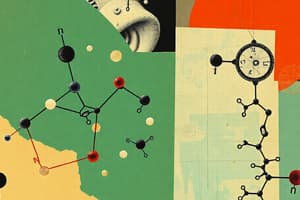Podcast
Questions and Answers
Which enzyme deficiency is responsible for classical galactosemia?
Which enzyme deficiency is responsible for classical galactosemia?
- Galactose-1-phosphate uridyl transferase (correct)
- UDP galactose-4-epimerase
- Galactokinase
- Aldose reductase
Which function is NOT associated with glucagon?
Which function is NOT associated with glucagon?
- Gluconeogenesis
- Glycogenolysis
- Glycolysis (correct)
- Ketogenesis
What deficiency might be indicated in the liver of a child presenting with hypoglycemia and elevated ketone bodies after moderate activity?
What deficiency might be indicated in the liver of a child presenting with hypoglycemia and elevated ketone bodies after moderate activity?
- Glucose-1-phosphate
- Glucose-1,6-diphosphate
- Glucose-6-phosphate (correct)
- Glycosaminoglycans
Which is the primary source of reducing equivalents for fatty acid synthesis in the liver?
Which is the primary source of reducing equivalents for fatty acid synthesis in the liver?
Which of the following does NOT serve as a substrate for gluconeogenesis?
Which of the following does NOT serve as a substrate for gluconeogenesis?
Which enzyme deficiency is responsible for Pompe disease?
Which enzyme deficiency is responsible for Pompe disease?
What is the primary consequence of the lysosomal acid alpha glucosidase deficiency in Pompe disease?
What is the primary consequence of the lysosomal acid alpha glucosidase deficiency in Pompe disease?
What type of carbohydrate molecule accumulates in patients with Pompe disease?
What type of carbohydrate molecule accumulates in patients with Pompe disease?
Which enzyme's deficiency is associated with Tay-Sachs disease?
Which enzyme's deficiency is associated with Tay-Sachs disease?
Which substance is critical for maintaining corneal transparency?
Which substance is critical for maintaining corneal transparency?
Flashcards are hidden until you start studying
Study Notes
Enzymatic Deficiencies and Disorders
- Classical galactosemia results from a deficiency in galactose-1-phosphate uridyl transferase, leading to galactose accumulation.
- Lysosomal acid alpha-glucosidase deficiency causes Pompe disease, characterized by glycogen buildup in tissues, particularly skeletal and cardiac muscles.
- Aldose reductase is involved in glucose metabolism but is not related to classical galactosemia symptoms.
- Galactokinase deficiency leads to symptoms like cataracts and galactose in blood and urine, known as galactosemia type II.
Hormonal Functions
- Glucagon primarily stimulates gluconeogenesis, glycogenolysis, and ketogenesis but does not promote glycolysis.
- Glycogenolysis refers to the breakdown of glycogen to glucose, while gluconeogenesis involves the synthesis of glucose from non-carbohydrate sources.
Metabolic Disorders
- A 10-year-old boy with hypoglycemia, high ketones, lactic acid, and triglycerides along with enlarged liver and kidneys exhibits glucose-6-phosphate deficiency.
- Glucose-6-phosphatase plays a critical role in glucose metabolism by hydrolyzing glucose-6-phosphate to glucose in the liver and kidneys.
Substrates for Glucose Synthesis
- Key substrates for gluconeogenesis include glycerol, alanine, and lactate; however, acetyl coenzyme A does not serve as a substrate for glucose synthesis.
Red Blood Cells Metabolism
- Red blood cells (RBCs) primarily rely on glucose as their metabolic fuel during fasting periods.
Diagnostic Markers
- Diagnostic markers include:
- Beta-glucocerebrosidase for Gaucher disease;
- Lipase for acute pancreatitis;
- Ceruloplasmin for hepatolenticular degeneration.
- An incorrect pairing involves beta-glucocerebrosidase with Von Gierke disease, which is actually associated with glucose-6-phosphatase deficiency.
Glycated Hemoglobin
- HbA1C serves as a marker for long-term glucose control in diabetes, reflecting average blood glucose over 2-3 months.
- Ion exchange chromatography is the preferred method to measure HbA1C due to its ability to separate forms of hemoglobin based on charge properties.
Studying That Suits You
Use AI to generate personalized quizzes and flashcards to suit your learning preferences.



